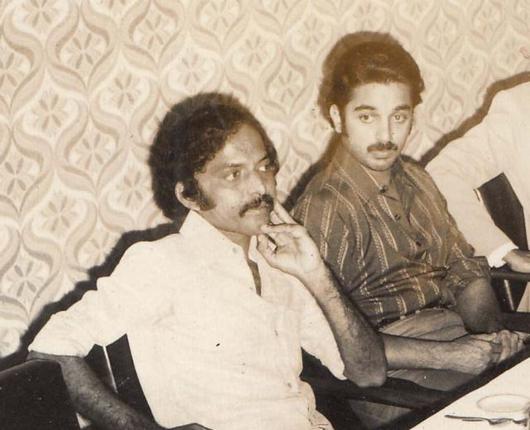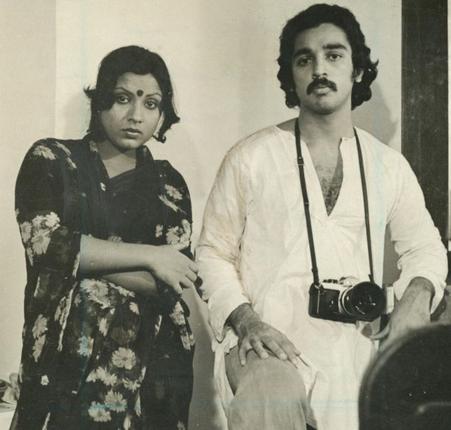
Kamal Haasan, in this first person account, recounts his experiences with Rudhraiya, director of Aval Appadithan, who passed away earlier this week.
“I first heard of director Rudhraiya from my mentor and writer Ananthu as this ‘brilliant student from the film institute.’ Of course, back then, we all knew him by his real name — Arumugam. He was this dashing young gold medallist from the Chennai film institute. He was also the students’ union leader and had the reputation of being a rebel. He made it quickly into our inner circle, a group of people driven by the passion to transform the world of Tamil cinema, such as myself, R. C. Shakthi, and Ananthu. In fact, there was a time when people would dread our meeting, as they knew that we’d be busy talking for hours together. One of my earliest memories of Arumugam has him helping me settle into the role of Prasanna, the protagonist with leftist views, in Apoorva Raagangal. A man with similar beliefs, he offered me invaluable advice.
I remember the conversations we would have back then. Films by directors such as Godard, Polanski, Rossellini, and Bresson featured regularly in our afternoon conversations. His connections with the Chennai film institute ensured that we were able to procure foreign films from there and send them a day later to the Pune film institute after watching them. It was like a Woodstock festival at Eldam’s Road. We were driven to make a film that we could be proud of, a film that would elevate our industry. The result: Aval Appadithaan.
I remember him as a man driven by a lot of anger. That’s perhaps why he rechristened himself Rudhraiya. His debut film was a pet project of our gang. That differentiated all of us from being just talkers. We were also doers. For a film that was shot mainly during my spare time (it was a year when I was acting in more than 20 films), we managed to give it great touches. The opening scene when I look into the camera and say “Konjam left-la ukaarunga” was meant as an encouragement to the audience to have leftist leanings. For a project born out of anger against the mainstream content of Tamil cinema, it could have easily turned out to be a whiny film, but it didn’t. Of course, the lack of finance meant it wasn’t a technically great film. Ilaiyaraaja was busy, and yet, we managed to arm-twist him into composing music.
It was amazing that during such a time, Rudhraiya, as he would have liked to be called in this piece, brought all of us together. He got us shooting with whatever camera we could lay our hands on. The good intention of the project meant that people like Rajini and Sripriya agreed to work, even though there was very little money in it. Ananthu and he wrote about women’s liberation at that time. Even when shooting, we would discuss so much about foreign cinema. Before a shot, for example, we could be heard asking each other how Godard would probably shoot that scene, how much exposure would he have used… We shot the film in two-hour sessions over four-five months, and when it came out, the result was amazing.
I was supposed to have acted in his second film, Raja Ennai Mannithuvidu, which unfortunately didn’t take off. It was a great story, but my work in films such as Sagalakalavallavan thwarted our coming together again. The industry had also humbled me a bit after Raja Paarvai. He didn’t take kindly to my acting in Sagalakalavallavan. And I remember patiently trying to calm his outburst by explaining that we needed money to make good films, and the commercial films I had taken to acting in, were only a means to that end. In its place, he made Gramathu Athiyayam and I had a few disagreements with him over it. I liked the idea, but felt that Aval Appadithaan’s synergy wasn’t there.
He was a different man in a way. It’s a pity that we mainly remember and herald the commercial successes more than the critical ones. He had so many more films in him, but could only make those two. This is why the West has festivals like Sundance that ensure such people aren’t left frustrated. Perhaps the strong revival of films like Aval Appadithaan will force people to consider bringing in an alternative movement, an alternative platform for parallel films.
He was also a man who took fierce pride in his work. He wouldn’t settle for working under somebody else. He knew so much about cinema and expected to take control. The camaraderie that was part of Aval Appadithaan, I think, he expected from other films. But it was not to be.
I met him again a year ago. Even during his last years, it was clear he hadn’t given up hopes of making another movie. Moviemaking, as many of us know, is an addiction. Some have stepped away, and some others keep trying. He belonged to the second category and I respect him for it. He needed more help from the industry. Just like Bharati will forever be remembered for his poetry, Rudhraiya will forever be remembered for the great film he made.

The world will remember him for Aval Appadithaan, a film that shook the foundations of the Tamil film industry and still does. College students still watch it and generations are scratching their heads over how we managed to bring it out. I will remember him for his passion for cinema. He was one of those directors who wouldn’t mind holding a reflector aloft, if it meant that a scene would look better.”
As told to Sudhir Srinivasan
source: http://www.thehindu.com / The Hindu / Home> Features> Cinema Plus / November 19th, 2014